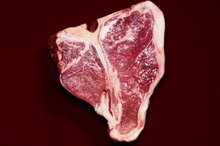How to Reduce Acid in Urine
When urine becomes acidic, uric acid stones may form in the kidneys. Kidney stones cause symptoms such as pain in the back or side, burning during urination, blood in the urine and nausea 1. Lab tests on your urine can determine the acidity level and screen for risk factors that may cause the kidney stones 1. Risk factors that may increase the acidity of urine include starvation, diarrhea and uncontrolled diabetes. Making changes to your diet and lifestyle may help reduce the acidity of your urine and decrease the formation of kidney stones 1.
Drink water. Drinking plenty of water will help prevent kidney stones and will help decrease the acidity of your urine by diluting it 1. The amount of water necessary for your body depends on factors such as your activity level, according to the National Kidney and Urologic Diseases Information Clearinghouse.
Furosemide & Potassium
Learn More
Eat vegetables, citrus fruits and beans to help decrease the acidity in your urine. Diets high in animal protein such as meat and dairy products may cause and increase in acidic urine.
Decrease the amount of purine-rich foods you eat. Foods containing high amounts of purines include organ meats, fish and eggs. Uric acid forms in the urine when the body breaks down purines.
Foods That Trigger Bladder Spasms
Learn More
Lose weight. Being overweight increases the risk of uric acid in the urine. Eat a healthy diet and exercise each day to help reduce weight, recommends Jill Pluhar, R.D.
Avoid products such as cranberry juice or ascorbic acid because these items may increase urine acid levels.
Urinate when you first feel the urge. Holding urine in the bladder causes a decrease in water content in the urine and makes it more acidic.
Stop taking medications that cause a decrease in urine pH levels, which is acidic urine. Medications that may cause acidic urine include thiazide diuretics and ammonium chloride, according to MedlinePlus 24.
Related Articles
References
- MayoClinic.com: Kidney Stones
- MedlinePlus: Cystitis
- Merck Manuals: Stones in the Urinary Tract
- MedlinePlus: Urine pH
- RnCeus.com: Urine pH
- American Urological Association. Diagnosis, Evaluation and Follow-up of Asymptomatic Microhematuria (AMH) in Adults. 2016.
- Urinalysis. Visual Examination. Lab Tests Online. https://labtestsonline.org/understanding/analytes/urinalysis/ui-exams
- Perrier ET, Johnson EC, McKenzie AL, Ellis LA, Armstrong LE. Urine colour change as an indicator of change in daily water intake: a quantitative analysis. Eur J Nutr. 2016;55(5):1943–1949. doi:10.1007/s00394-015-1010-2
- Cortes-Penfield NW, Trautner BW, Jump RLP. Urinary Tract Infection and Asymptomatic Bacteriuria in Older Adults. Infect Dis Clin North Am. 2017;31(4):673–688. doi:10.1016/j.idc.2017.07.002
- Dreger NM, Degener S, Ahmad-Nejad P, Wöbker G, Roth S. Urosepsis--Etiology, Diagnosis, and Treatment. Dtsch Arztebl Int. 2015;112(49):837–848. doi:10.3238/arztebl.2015.0837
- Jump RL, Crnich CJ, Nace DA. Cloudy, Foul-Smelling Urine Not a Criteria for Diagnosis of Urinary Tract Infection in Older Adults. J Am Med Dir Assoc. 2016;17(8):754. doi:10.1016/j.jamda.2016.04.009
- Kang KK, Choi JR, Song JY, et al. Clinical significance of subjective foamy urine. Chonnam Med J. 2012;48(3):164–168. doi:10.4068/cmj.2012.48.3.164
- Blackburn PR, Gass JM, Vairo FPE, et al. Maple syrup urine disease: mechanisms and management. Appl Clin Genet. 2017;10:57–66. Published 2017 Sep 6. doi:10.2147/TACG.S125962
- Prakash S, Saini S, Mullick P, Pawar M. Green urine: A cause for concern?. J Anaesthesiol Clin Pharmacol. 2017;33(1):128–130. doi:10.4103/0970-9185.202190
- Torres PA, Helmstetter JA, Kaye AM, Kaye AD. Rhabdomyolysis: pathogenesis, diagnosis, and treatment. Ochsner J. 2015;15(1):58–69. PMID: 25829882
- Rehfuss A, Mahon J, Sorokin I, Smith C, Stein BS. Phenazopyridine: A Preoperative Way to Identify Ureteral Orifices. Urology. 2018;115:36-38. doi:10.1016/j.urology.2018.02.023
- American Urological Association. Diagnosis, Evaluation and Follow-up of Asymptomatic Microhematuria (AMH) in Adults. 2016.
- Worku DA. Purple urine bag syndrome: An unusual but important manifestation of urinary tract infection. Case report and literature review. SAGE Open Med Case Rep. 2019;7:2050313X18823105. Published 2019 Jan 12. doi:10.1177/2050313X18823105
- Alkaptonuria. National Institutes of Health. Genetic and Rare Diseases Information Center. 3/18/2016
- Seo JW, Lee JH, Son IS, et al. Acute oxalate nephropathy caused by ethylene glycol poisoning. Kidney Res Clin Pract. 2012;31(4):249–252. doi:10.1016/j.krcp.2012.09.007
- Urinalysis. Visual Examination. Lab Tests Online.
Writer Bio
Abigail Adams began her freelance writing career in 2009, teaching others about medical conditions and promoting wellness by writing on online health and fitness publications. She is educated and licensed as a registered nurse, having received her degree from North Georgia College and State University.









